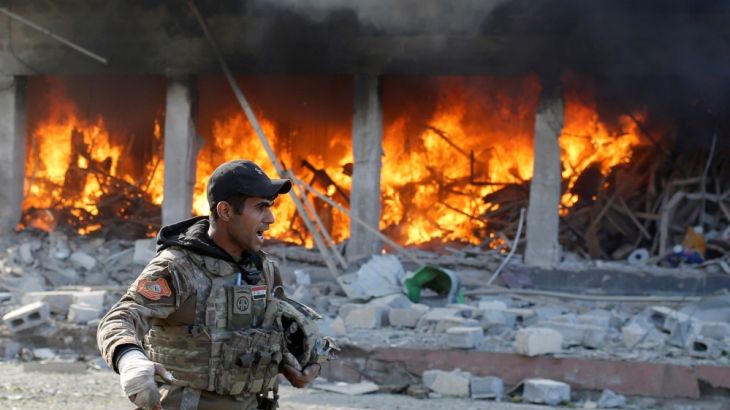Water supply cut off for half of Mosul
Almost 650,000 people in Mosul left without water after pipeline was hit during fighting between Iraqi forces and ISIL.

Fighting between Iraqi forces and ISIL fighters has cut water supplies across a large part of Mosul, affecting 40 percent of residents in the city where poorer families are already struggling to feed themselves.
Water was cut to 650,000 people when a pipeline was hit during fighting between ISIL and the Iraqi government forces trying to crush them in their northern Iraq stronghold.
Keep reading
list of 4 itemsIn the jungle with Myanmar’s rebels as thousands of new recruits join
‘Old friend’ Putin and China’s Xi strengthen strategic ties at summit
Russia-Ukraine war: List of key events, day 812
“We are facing a humanitarian catastrophe,” said Hussam al-Abar, member of Mosul’s Nineveh provincial council, adding that 1.5 million people were still inside Mosul.
“Basic services such as water, electricity, health, food are non-existent.”
Barely more than a third of the 200,000 displaced that the UN had expected in the first few weeks of the Mosul offensive have fled their homes so far.
|
|
The lack of clean drinking water could now make it difficult for residents to remain, however.
“There is no water, we drink water from the well. It’s very salty and we have to boil it before we drink it,” Umm Ahraf, a 45-year-old woman, told AFP news agency in the Khadraa neighbourhood on Tuesday.
The battle for Mosul has already raged for six weeks. Iraqi commanders said around 40 percent of the eastern half of Mosul has been retaken from ISIL since the huge offensive began on October 17.
The forces have told civilians to stay at home to avoid massive displacement from the city, which was believed to have a population of a million-plus before the operation started.
Al Jazeera’s Hoda Abdel-Hamid, reporting from eastern Mosul, said the city was “becoming one big urban battlefield.
“The large presence of civilians is slowing the military operations down,” she said. “But among those who managed to get out of the city, there is a feeling that this offensive should have started much earlier.”
READ MORE: Battle for Mosul – ISIL’s innocent victims
Aid workers say a full siege is developing and fear that the longer the conflict drags on, the more civilians will suffer.
“Key informants are telling us that poor families are struggling to put sufficient food on their tables,” UN Humanitarian Coordinator in Iraq, Lise Grande, told Reuters news agency.
“This is very worrying. In a worst case, we envision that families who are already in trouble in Mosul will find themselves in even more acute need. The longer it takes to liberate Mosul, the harder conditions become for families.”
|
|
The capture of Mosul, ISIL’s last major urban stronghold in Iraq, is seen as crucial towards dismantling the caliphate which the group declared in Iraq and Syria.
A spokesman of the coalition, US Airforce Colonel John Dorrian, said there was “a sense of urgency” to capture the city, without giving a target timeframe.
A fleeing seven-year-old child was among dozens more civilians allegedly executed by ISIL in Mosul in recent weeks, the UN said on Tuesday.
Since the battle to retake Mosul began, the UN rights office has reported hundreds of alleged execution-style killings by ISIL.
The most recent allegations include a November 22 killing of “a seven-year-old child who was running towards the Iraqi Security Forces in Adan neighbourhood in eastern Mosul”.
In a November 25 incident, 27 civilians were reportedly shot dead in Mosul’s northern Muhandiseen Park, possibly for “leaking information” to the Iraqi Security Forces, the UN added.
On Tuesday, Iraqi forces assaulted villages far south of Mosul in the Nineveh province, attempting to clear rural areas of ISIL fighters who stayed behind to hinder their advance.
Some 74,000 civilians have fled Mosul so far, and the UN is preparing for a worst-case scenario which foresees more than a million people made homeless as winter descends and food shortages set in.
